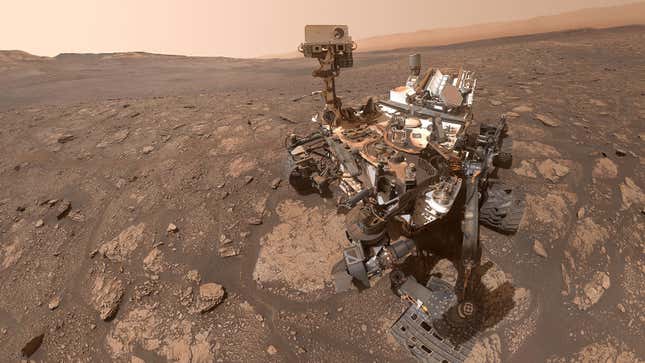
NASA’s Curiosity rover has been hard at work over the past several months at a site thought to contain ancient surface materials. And as this stunning new selfie shows, the dust-covered probe is really starting to blend into its environment.
Curiosity has been exploring Mars since 2012, and it’s certainly starting to show. With the closest car wash located nearly 51 million miles (82 million kilometers) away, the six-wheeled machine, covered in dust, has taken on the complexion of the Red Planet.
The 59 photos used to create this mosaic image were taken on October 25, 2020, according to a NASA statement. Imaging experts with the space agency carefully stitched the photos together, in such a way to remove the rover’s Mars Hand Lens Camera (MAHLI).

An impressive, high-res 37 MB version of this image can be downloaded here, which I’ve done and made into my desktop wallpaper. A smaller version can be found here.
Oh, and check out the rover’s middle wheel at the right of the image. Lookin’ a bit rough, but we already knew that (don’t worry, the next Mars rover, currently en route, has much tougher wheels).
The workhorse rover has been drilling and analyzing surface samples at a new site called Mary Anning, which NASA mission controllers named in honor of the 19th-century English paleontologist. The name is fitting, as the site could provide key insights into the past. But instead of searching for Jurassic fossils, Curiosity is searching for organic, carbon-based molecules. A key goal of the Curiosity mission is to detect signs of past habitability on Mars.

Curiosity arrived at the Mary Anning site in July, where it has drilled three holes: Mary Anning, Mary Anning 3, and Groken (named for cliffs in Scotland’s Shetland Islands). The probe can analyze the samples taken from these drill holes by using its built-in lab, called CheMin. The resulting data is then pored over by the team back on Earth, in a process that’s expected to take months.
From here, Curiosity will be directed toward a layer of sulfate-rich rocks that are located at a higher elevation along Mount Sharp. The rover should reach this area early next year.
Excitingly, NASA’s Perseverance rover, with its fancy extra-durable wheels, is now less than 100 days away from arriving at Mars. The next-gen rover is scheduled to land in Jezero Crater on February 18, 2021. Perseverance will join Curiosity and the InSight lander as the only three functioning probes still working on the Red Planet.